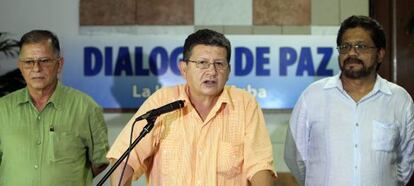Santos to seek people’s approval over any peace deal with FARC rebels
Colombian president plans to add vote to upcoming election ballot if deal reached in time

Colombian president Juan Manuel Santos appears increasingly confident that a peace deal with the guerrilla group FARC will be signed before the year is out. This Thursday, following a meeting with the parties that make up the ruling coalition, Santos announced a bill to let Colombians decide whether or not they validate the agreement reached in Havana through a referendum to be held on the same day as the next elections (whether parliamentary or presidential).
Although such a thing is, in fact, forbidden by Colombian law, Santos said that the situation calls for a lift on the ban. "It is a very simple project, with just three articles, which simply says that a constitutional referendum on the occasion of a final accord to terminate the armed conflict may coincide with other electoral events," said the president.
In other words, the poll would be held either during the congressional elections in March 2014 or the presidential elections two months later. In either case, voters would receive an additional voting card to express their opinion on the peace agreement, should one ultimately be signed before that date.
A referendum is one of the final points on the negotiation agenda between the government and the guerrilla group. Ever since Santos announced the beginning of talks in September 2012, he insisted that any resulting deal must be supported by the Colombian people. This means that even though the talks have been held behind closed doors for now, once a deal is reached, Colombians will have the final word.
It would be terribly irresponsible of us not to have planned ahead for this possibility."
Meanwhile, the FARC believes that the best way to garner support for any emerging accord is through a National Constitutional Assembly. Rodrigo Granda, better known as the FARC's chancellor, has said that the idea for such an assembly is not a whim of theirs but "a national clamor." Iván Márquez, head of the FARC's negotiating team, has said that they view the initiative as the ideal way of sealing a peace deal. "The sovereign people are the legitimate authority of the nation, and we will submit to the popular will, to what the people say at this Constitutional Assembly."
But this position has been almost unanimously rejected by various sectors of the Colombian establishment, who do not see the need to rewrite the Constitution after just 22 years. The government has already expressed its complete disagreement with the notion.
"Rather than a mechanism for endorsement, it is a setting for new deliberation. It is not the end of the dialogue, but a new starting point for it. Instead of approving what's been agreed to, it opens the door to revision and even the denial of what was previously accepted," said Humberto de la Calle, the government's chief negotiator.
In Santos's view, the decision to hold a referendum coinciding with elections is a responsible way to anticipate a peace deal. "If we don't reach an agreement, then never mind. But if we reach a deal, and if we reach it before year's end, like we all want to, and we don't have the tools to endorse it, then it would be terribly irresponsible of us not to have planned ahead for that possibility."
Senate speaker Juan Fernando Cristo, a liberal, said that having the referendum coincide with elections is a way to guarantee the widest possible participation. President Santos has called on the opposition Polo Democrático to join their project. It remains to be seen how the FARC will respond.
Tu suscripción se está usando en otro dispositivo
¿Quieres añadir otro usuario a tu suscripción?
Si continúas leyendo en este dispositivo, no se podrá leer en el otro.
FlechaTu suscripción se está usando en otro dispositivo y solo puedes acceder a EL PAÍS desde un dispositivo a la vez.
Si quieres compartir tu cuenta, cambia tu suscripción a la modalidad Premium, así podrás añadir otro usuario. Cada uno accederá con su propia cuenta de email, lo que os permitirá personalizar vuestra experiencia en EL PAÍS.
¿Tienes una suscripción de empresa? Accede aquí para contratar más cuentas.
En el caso de no saber quién está usando tu cuenta, te recomendamos cambiar tu contraseña aquí.
Si decides continuar compartiendo tu cuenta, este mensaje se mostrará en tu dispositivo y en el de la otra persona que está usando tu cuenta de forma indefinida, afectando a tu experiencia de lectura. Puedes consultar aquí los términos y condiciones de la suscripción digital.








































